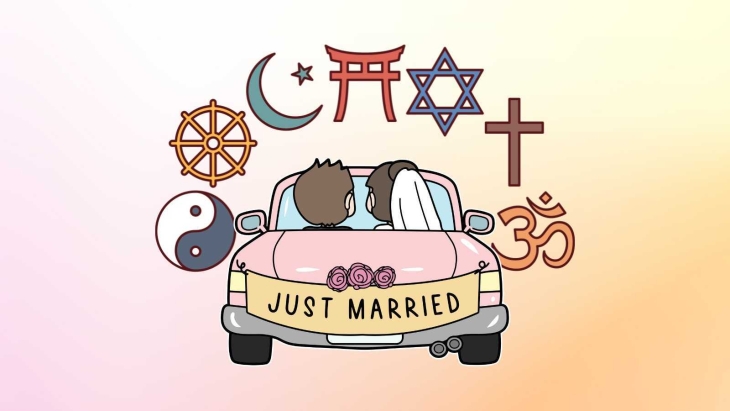Recent Posts
Most Popular
Why is it a big deal if someone marries another person with a different faith? The challenges of an inter-faith marriage.

Marriage is a sign of commitment to a relationship. Research has strong evidence that links being married to better mental and physical health.
However, the picture of marriage seems to be bleak in the US. It is seeing plummeting rates of people getting married and current statistics show that almost half of those who got married end up getting separated or divorced.
Despite these figures, the US is seeing a kind of marriage increase over time- interfaith marriages. Surveys from PEW Research institute report that sharing the same religion with the spouse is now becoming less of a priority among Americans who get married recently compared to those in older marriages.
In fact, 2010 data from Pew’s Religious Landscape Study presents a 20% increase in interfaith marriages since 1960, with the Christians marrying someone who is religiously unaffiliated as the most well-represented group (18%).
The interfaith partnership trend is also seen among unmarried people, as 49% of couples who are unmarried have a different religious affiliation than their partners.
What are the challenges of being in an interfaith marriage?
In the past, marriage ceremonies were testaments to how a couple would like to live their social lives, that is, to live it with the spiritual community as its foundation.
Nowadays, marriage ceremonies represent people’s individuality, their own values, and preferences. This then reflects how their family life will be structured. In fact, according to the American National Family Life Survey, only 16% of those who married partners from a different faith would attend a worship service once a week, compared to 44% of those who married within their faith.
- Different worldviews.
Ask yourselves what worldviews do you hold dear about:
- Raising children,
- Relationships with extended family, relatives,
- Celebrating important holidays.
- And many more.
Are there things about these worldviews that are non-negotiable to you? What can each of you tolerate? One hindrance in couples belonging to different religious groups is the failure to consider these topics realistically before marriage.
In this case, pre marriage counseling might benefit both parties to help facilitate discussion of these sensitive yet key issues.
- The pressure to convert into another faith tradition.
In some cases, one partner is pressured into converting into another religion, despite them not being comfortable with it. Some go through it for the sake of complying with family and societal pressure.
- When religion and culture are rolled into one, it is difficult to live in harmony with a partner while trying to separate religion and culture.
In some faith groups, religion has been well integrated into the culture, with cultural holidays, activities and traditions also having religious significance in them. If one partner feels that their culture must live on in their family, then participation in these religious activities may become mandatory. It can cause friction not only on the couple, but also on their children.
- The need to make decisions about what religion the family must follow.
The talk of practicing a certain religion may come up again once the children are growing. The couple might feel and think differently about how they want to raise their children. Do the children follow one religion, or do they get to attend both and choose their own religion later on?
- Issues about religious education.
Couples of different faiths might insist on educating their children about their own beliefs and religious practices. This may put children in the middle of conflict when the couple does not reach agreement.
Conflict might include arguing about their faith. Some couples agree not to touch the subject of religion altogether in order to avoid arguments, but this causes tension to build up.
If tension and disagreement reach their peak, the marriage may become rocky. Working together through couples therapy or marriage counseling may be helpful.
The rise of interfaith marriages in the last decade shows us that tolerance and openness in the faith communities are increasing. Truly, there are a lot of challenges that mixed-faith families continue to face, so couples can consider the key issues that might cause friction in the relationship in order to prepare for these future challenges.
Are you a healthcare professional? Sign up and create your account to receive updates on job listings in the medical field!








Comments